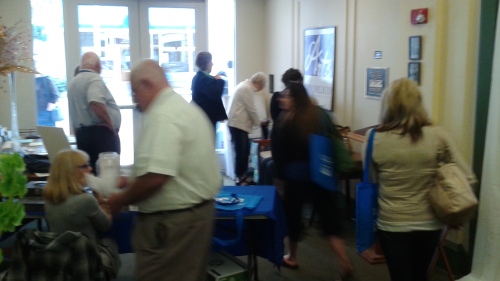As a writer, writers conferences are part of the package. While it does matter where you go and what type of event you attend, there seem to be a few things that are always the same.
Writers in every stage of the journey
At a typical conference, you will meet people that vary from those trying to write those first words, still struggling to identify what type of story they will pen, and those writers who have twelve books finished, three published, and two publishers vying for their hand for the next book (I completely made those numbers up. Point is, there will be someone whose success you will be jealous of). Why is the successful author at a conference if they’re not a speaker? The same reason you’re attending – they are there to learn.

New information
Regardless of the topics discussed in the conference, you will learn things you didn’t know before. Certain things that the speakers say will inspire you. Bring pen and paper. You will be taking notes. Lots of notes.

Old information
At some point, someone (a new friend, vendor, speaker, etc.) will recite information that you already know. It will seem pointless for you to hear this information. But others in the crowd need to hear it.
Books for sale!
Bring spending money to the conference – everyone will be selling books and other writing essentials! You may not plan to spend a dime. But you likely will. Either a speaker will be engaging, and they offer a book with more information, or you get caught up in the story they’re sharing, and you find yourself wanting to know what happens next.

Publishers!
Yes, publishers of all shapes and sizes frequent these conferences. While traditional, reputable publishers make time to talk to authors, vanity presses and self-publishing companies frequent these things, too. Don’t be afraid to research and ask questions.
With that warning in mind, though, you can walk into a writers conference knowing you will be speaking to a publisher. Have material ready to give them, but don’t be surprised if they don’t read it. They may want to hear more at a later time, and that’s okay, too.

Business Cards
I didn’t realize until the day before my own writers conference began that I needed to have business cards ready to hand to people. I went to Office Depot and bought some printable cards. I spent about half an hour designing a basic one. If you’re in a pinch, do that.
If you have time, go to Vistaprint and spend $10 for your own card. You won’t be disappointed, and you’ll look very professional
Conflicting Information
It’s easy to suffer from information overload if you attend several classes a day. And with several classes come several teachers, who all have their own opinion about writing. The only hard and fast rule of writing seems to be there are no rules. Some teachers will present their opinion in order to get you to a desired goal. Another teacher, talking about the same thing, will tell you to do the exact opposite – since that worked for them.
Again, don’t be afraid to ask questions. You will receive information you won’t always agree with. That doesn’t mean the teacher is a moron. It means that you’re a different type of writer. But also trust that the teacher knows more than you about whatever it is they’re teaching. Chances are, they’re right.

Food!
Yes, all writers conferences seem to have food of some kind – even if it’s just snacks. Bring your appetite!

